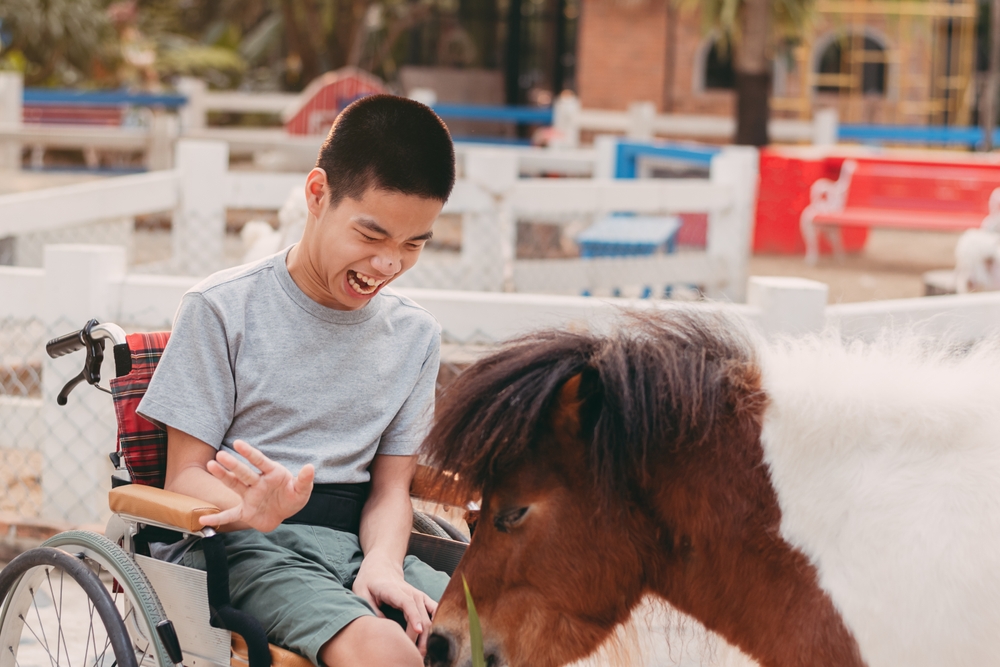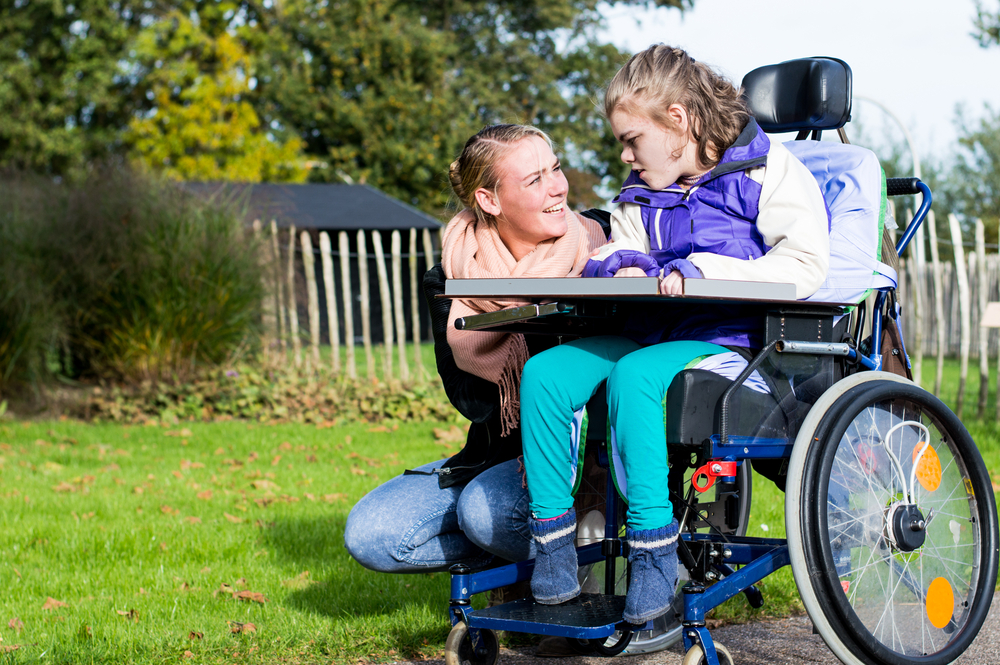
Interacting with animals, including lions, tigers, bears, cows, tortoises, horses, and other creatures, can have profound therapeutic benefits for children with disabilities. These interactions offer unique opportunities for sensory stimulation, emotional connection, boosted confidence, and personal growth.
Children with disabilities often face a significant amount of stress, which can hinder their healing. The presence of animals offers a needed distraction and helps lower stress for these children. Studies have found a direct connection between animal interactions and positive physical, mental, and emotional health benefits among children and adolescents. In one study, human-animal environment interactions had positive effects on human health, including improved moods, social and interpersonal skills, and reduced fear, stress, and anxiety.
For children with disabilities, the simple act of being outdoors holds immense joy. The scent of blooming flowers, the taste of fresh air, the presence of animals, and the excitement of discoveries all converge to create a profound sense of happiness. The outdoor environment becomes a realm of multisensory delight, where nature's offerings and the presence of animals intertwine to provide an enriching and emotionally uplifting experience.
Here's an exploration of how these interactions can improve the quality of life in children with disabilities:
Many children with disabilities, such as autism spectrum disorders, sensory processing disorders, or physical disabilities, benefit from sensory experiences. Something as unique or majestic as the sound of a lion’s roar or the simple texture of a donkey’s fur provides a range of sensory stimuli. These sensory activities can help children explore and understand their environment, enhancing their sensory integration skills.
Scientific research has shown that human-animal interaction can help reduce anxiety and stress levels. Spending time with animals, even for short periods, can:
Children with disabilities often face higher levels of stress due to their challenges. Interacting with animals like bears or tigers in a controlled and safe environment of an accredited sanctuary like Lions Tigers and Bears can create a sense of wonder and distraction that temporarily alleviates stress.

Animals offer a rare form of unconditional acceptance. For children who often experience feelings of exclusion or struggle with self-esteem, the companionship of an animal can be life-changing. Animals don't judge based on appearances or abilities; they offer affection and companionship regardless.
This unwavering acceptance fosters emotional growth, teaching children to form healthy relationships and boosting their self-confidence. The simple act of caring for an animal can instill a sense of responsibility and accomplishment, contributing to emotional wellbeing.
Interacting with animals can help children develop empathy and emotional understanding. When a child cares for animals' needs, observes their behaviors, and recognizes their emotions, they can be able to recognize and express their own emotions as well. This can be especially beneficial if they have conditions that affect emotional regulation. Even kids with severe mental health issues can benefit from these interactions.
According to experts, animals can help a person navigate a manic episode, which is characterized by elevated mood, extreme energy, and impulsive behavior. The calming presence of animals can provide a grounding influence and help redirect their attention and energy, potentially preventing impulsive behaviors and promoting a sense of calm.
Children with speech or communication difficulties may find animals to be more motivating communication partners. They might initiate verbal or nonverbal communication to interact with animals, which can eventually extend to human interactions as well. This can be a stepping stone for language development and social engagement.
Animals like horses thrive in non-verbal communication, and when they feel unsafe or threatened, they’ll retreat from the perceived threat. Since they can recognize emotion, children can see the immediate effect of responding positively to the horse. This way, a horse serves as a mirror to the child’s behavior, and this can be a teachable moment for how their actions or behaviors affect others.
Animals provide a bridge to nature, fostering an understanding and appreciation for the environment. This connection can be therapeutic in itself, promoting a sense of connectedness to the world around them.

Animal-related activities for children can provide opportunities for group activities and socialization. Group interactions with animals, without petting, can be experienced through visits to disability-friendly accredited sanctuaries such as Lions Tigers and Bears. Moreover, participating in animal-assisted therapy sessions with domestic animals we have, like tortoises, mini horses, and goats, provides a unique way for children to connect. It's essential to highlight the clear distinction between these different animal experiences, ensuring safe and positive interactions.
Here at Lions Tigers & Bears (LTB), our highly skilled and compassionate staff, including childcare professionals, provide a special and inclusive experience for children with unique needs, such as autism, Down syndrome, depression, and those with physical limitations. We extend a warm and heartfelt welcome to anyone who can find solace and joy in the therapeutic bond between humans and animals that we offer.
During a visit, our team will tailor the experience to suit one’s specific learning capacity, introducing them to the incredible animals under our care. They will have the privilege of witnessing our dedicated keepers providing essential care for the exotic animals, as well as the opportunity to experience our domestic animals like cows, tortoises, horses, and more. Our guided tours have proven to be a source of comfort and emotional healing for children and adults of all ages, leaving a positive impact on their overall well-being.
One touching example comes to mind – a young guest diagnosed with ADHD whose mother was apprehensive about the day's activities. To our delight, the child was completely enthralled by the events, attentively absorbing every bit of information and responding with genuine emotional reactions to each story shared.
At LTB, witnessing the joy and happiness of these special children fills our hearts with profound satisfaction, making our mission all the more meaningful and rewarding.
Under the leadership of our Director, Bobbi Brink, and the unwavering dedication of our staff, we have devoted tremendous effort to ensure that our sanctuary is a safe and welcoming haven for people of all ages and backgrounds. Every aspect of our environment is carefully designed, making the safety and well-being of our guests, volunteers, staff, and animals a top priority.
We take great pride in being a fully accredited facility, strictly adhering to a no-contact policy between people and animals. Our habitats are thoughtfully constructed to maintain a respectful distance, always separated by sturdy fences, allowing our visitors to admire the animals from a safe place. As a team, we embrace and practice responsible conduct within the sanctuary, adhering to protocols and procedures that ensure the utmost safety of everyone involved.
During your visit, our staff works in teams, not only to manage crowds and secure gates but also to create an environment of warmth and support. We are committed to serving guests with special needs, offering a mobile cart with a handicap ramp for those in wheelchairs. Moreover, our team members maintain constant communication through radio, always keeping each other informed about any occurrences within the sanctuary.
At LTB, we understand the rarity and beauty of the sights we offer, but our true fulfillment lies in ensuring that every visitor departs with their hearts touched and spirits lifted. We are honored to share this journey with you as we strive to bring joy and healing through our heartfelt connection with nature and its majestic inhabitants.

Ph: 619.659.8078
Fx: 619.659.8841
[email protected]
24402 Martin Way, Alpine, CA 91901